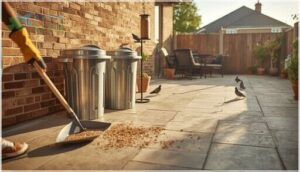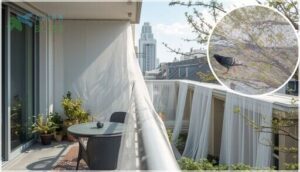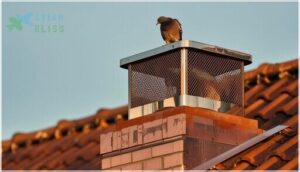This site is supported by our readers. We may earn a commission, at no cost to you, if you purchase through links.

Pigeons don’t just make a mess. They carry up to 60 transmissible diseases and cause over $1 billion in property damage across the USA each year. Their droppings eat through building materials and create serious health hazards.
But here’s what most people get wrong: chasing them away or using fake owls rarely works for long. Pigeons adapt fast and breed even faster when threatened. The solution isn’t more aggression. It’s smarter strategy.
Natural deterrents work because they make your property uninviting without triggering the survival instincts that cause rapid reproduction. You’ll protect your home, your health, and the broader ecosystem all at once.
Table Of Contents
- Why Natural Pigeon Control is Important
- What Attracts Pigeons to Your Property
- Remove Food Sources and Clean Up
- Install Physical Barriers to Deter Pigeons
- Use Reflective and Visual Deterrents
- Apply Natural and Homemade Pigeon Repellents
- Top 5 Natural Pigeon Deterrent Products
- Prevent Pigeon Nesting and Future Infestations
- Frequently Asked Questions (FAQs)
- What do pigeons hate the most?
- How do I get rid of pigeons ASAP?
- What repels pigeons naturally?
- Is there a way to keep pigeons away?
- How long does it take to see results?
- Are there any legal restrictions on pigeon control?
- Can pigeons spread diseases to humans?
- Do ultrasonic devices affect other animals or pets?
- How often should I reapply natural pigeon deterrents?
- Are ultrasonic devices effective against pigeons?
- Conclusion
Why Natural Pigeon Control is Important
Pigeons might seem harmless, but they bring real problems to your property and your health. Choosing natural control methods protects your home while respecting wildlife and the environment around you.
Let’s explore why humane deterrents make the smartest choice for long-term pigeon control.
Health Risks and Property Damage From Pigeons
Disease transmission isn’t just an abstract worry—pigeons create serious public health risks. Your property faces real dangers:
- Zoonotic Pathogens: Up to 49% of pigeons carry infectious diseases transmissible to humans through fecal contamination and aerosol exposure.
- Property Damage: Pigeon droppings cause over $1 billion in corrosive damage annually across the USA.
- Pest Control Costs: Professional cleanup usually runs $600–$1,000 for extensive infestations.
Understanding the impact of public health hazards is essential for effective pigeon control.
Environmental Benefits of Humane Deterrents
Choosing humane pigeon control strategies protects more than your property—it safeguards wildlife preservation and ecological balance. Urban areas using natural pigeon repellents see native bird populations increase by 25% within two years. Sustainable methods reduce chemical use by 60% and improve pollinator health by 35%.
Humane pigeon control safeguards wildlife preservation while boosting native bird populations by 25% within two years
Ecofriendly pest control fosters biodiversity conservation while addressing your pigeon problem. Green initiatives deliver results without harming the environment you’re trying to protect. Effective humane bird control methods are essential for maintaining a balanced ecosystem.
Challenges of Conventional Pigeon Control Methods
Traditional pigeon control methods often backfire. Lethal control creates population dynamics where survivors breed faster, restoring numbers within months. Studies on efficacy reveal habituation risks with fake owls and reflective devices losing impact in weeks. Chemical toxicity threatens non-target wildlife and workers alike.
Natural ways to get rid of pigeons avoid these pitfalls:
- Homemade pigeon repellent costs less and requires no repeated interventions
- Humane pigeon control strategies don’t trigger accelerated breeding cycles
- Effective pigeon deterrents work long-term without environmental harm
What Attracts Pigeons to Your Property
Pigeons don’t just show up randomly. They’re drawn to your property for specific reasons. Understanding what attracts them is the first step to keeping them away for good.
Common Food Sources and Nesting Materials
Pigeons thrive where you offer them an easy meal. Bread appears in 84% of urban pigeons’ diets, with processed grains following close behind. Your trash bins and outdoor pet food become their buffet.
| Food Attractants | Nesting Materials | Why Pigeons Love Them |
|---|---|---|
| Bread and pastries | Twigs and leaves | Readily available everywhere |
| Discarded takeout | Paper and cardboard | Easy to gather and use |
| Fallen birdseed | Plastic strips | Provide shelter and warmth |
| Pet food bowls | Dried grass | Accessible year-round |
Removing food sources for pigeons starts with better food waste management. Secure your garbage bins tightly. Clean up spilled seeds daily. Cover outdoor pet dishes when not in use.
Urban foraging habits make pigeons resourceful scavengers. They’ll exploit seasonal food spikes from festivals and markets. Seed dispersal patterns from your bird feeders attract them too.
Nesting material removal prevents pigeon nesting problems. Check your property for nesting areas filled with debris. Clear away twigs, paper scraps, and dried vegetation regularly. Roosting site cleanup eliminates comfortable spots where they settle in.
Shelter and Roosting Preferences
Shelter is a magnet for urban pigeons. You’ll find their roosting behavior favors flat ledges and sheltered nooks. These nesting sites mimic rocky cliffs—nature’s blueprint for pigeon adaptation. For effective pigeon nesting prevention, focus on physical barriers for pigeons in:
- Window ledges and sills
- Balconies and rooftops
- Covered corridors and verandas
Entry Points and Vulnerable Areas
Gaps in your roof invite trouble. Over 60% of pigeon infestations start at roof gaps, vents, and attic openings. Chimneys without caps? They’re entry points in 35% of nest removals.
Check window ledges, rooftops, and wall cracks twice yearly. Damaged vent seals or eave repairs left undone create access routes.
Seal openings larger than one inch to keep pigeons out for good.
Remove Food Sources and Clean Up
Pigeons won’t stick around if there’s nothing to eat. Cutting off their food supply is your first move in making your property less attractive.
Here’s how to eliminate what keeps them coming back.
Eliminating Outdoor Feeding and Food Scraps
You can’t win the war against pigeons if you’re feeding them. Urban sanitation and food waste management form the foundation of natural pigeon repellents. Public education and feeding bans work—Barcelona saw pigeon populations drop 40% within one year after residents stopped outdoor feeding.
Here’s your action plan for preventing pigeon infestations:
- Stop intentional bird feeding in outdoor areas immediately
- Clean up food scraps and spilled grains after meals
- Educate family members about wildlife conservation practices
- Support local feeding bans as natural ways to get rid of pigeons
Securing Garbage and Compost Bins
Open waste is like rolling out the welcome mat for pigeons. Lockable bins reduce foraging by 59%, and self-closing lids cut activity by 77%. You’ll see real results.
| Bin Security Measures | Effectiveness | Application |
|---|---|---|
| Lockable containers | 59% reduction | Garbage control methods |
| Self-closing lids | 77% decrease | Waste management |
| Mesh-covered compost | 85% prevention | Compost bin designs |
| Snap-lock caddies | 31% fewer sightings | Natural pigeon repellents |
Secure your bins—it’s one of the most effective natural ways to get rid of pigeons. Preventing pigeon infestations starts with smart waste management and proven pigeon deterrent techniques.
Cleaning Droppings and Nesting Debris
Pigeon droppings carry up to 60 transmissible diseases. You need proper disinfection methods before debris removal begins. Soak all droppings with a 10% bleach solution for at least 10 minutes to neutralize pathogens.
- Wear gloves and masks for biohazard control during cleanup
- Wet droppings thoroughly before scraping to prevent airborne dust
- Double-bag waste disposal for sanitation protocols compliance
- Clear nesting areas completely before installing pigeon net barriers
Install Physical Barriers to Deter Pigeons
Physical barriers are your first line of defense against persistent pigeons. They block access to the spots where pigeons love to land and nest.
Here are the most effective barriers you can install to keep pigeons off your property for good.
Bird Spikes for Ledges and Rooftops
You’ll find bird spikes are your most reliable physical barrier for keeping pigeons off ledges and rooftops. These anti-roosting spikes prevent landing without harming birds. Install them on window ledges, eaves, and parapet walls for effective roof protection and ledge guard coverage.
Proper spike installation takes about 15–30 minutes per 10 feet. Regular spike maintenance ensures these bird deterrents and pigeon repellent devices work alongside motion-activated sprinklers for lasting results.
Pigeon-proof Netting for Balconies and Trees
Netting materials like UV-stabilized polyethylene offer 99% pigeon exclusion when properly installed. You’ll spend $500–$1,500 per balcony, but installation costs pay off with 60–80% reduced maintenance expenses over five years. Choose mesh sizes between 19–50 mm for effective bird netting while protecting smaller species.
Essential pigeon proofing techniques:
- Anchor nets every 25–30 cm with stainless steel hooks
- Inspect for existing nests before preventing pigeon nesting
- Drape tree netting fully to ground level
- Schedule annual maintenance ($100–$250) for durability tests
- Monitor wildlife impact on non-target species
Sealing Gaps, Vents, and Entry Points
After installing netting, locate where pigeons actually enter your home. Over 60% of buildings have accessible gaps that invite intrusions. Focus on attic vents and eaves—these are entry points in 55% of cases.
Use ¼-inch hardware cloth or corrosion-resistant metal flashing for gap closure. Sealant materials like polyurethane work for openings under 0.25 inches.
Quarterly inspections cut pigeon-related entries by 60% when paired with immediate barrier installation.
Chimney Caps and Vent Covers
Beyond sealing smaller openings, your chimney and roof vents remain vulnerable entry points. Chimney cap installation delivers over 90% effectiveness in blocking pigeons and wildlife. Professional fitting ensures no gaps compromise your barrier.
Consider these vent cover materials for roof protection systems:
- Stainless steel caps offer 20+ years of durability
- Copper models provide aesthetic appeal with natural patina
- Hardware cloth works for secondary vents
- Galvanized options balance cost and performance
These bird exclusion methods integrate seamlessly with bird spikes and pigeon net systems you’ve already installed.
Use Reflective and Visual Deterrents
Pigeons rely heavily on their sharp vision to navigate and feel safe. When you introduce unexpected flashes of light or movement, it disrupts their comfort zone and makes your property feel less inviting.
Here are three visual methods that confuse and deter pigeons without causing them harm.
Reflective Tape, Scare Rods, and Mirrors
Visual deterrents like reflective tape and mirrors can cut pigeon presence by up to 40% initially. However, habituation effects set in within weeks. To achieve lasting results, rotate these reflective surfaces regularly with motion-activated sprinklers or homemade pigeon repellent.
| Method | Best Use |
|---|---|
| Reflective tape | Window ledges and railings |
| Scare rods | Open balconies and rooftops |
| Mirrors | Near feeding areas |
Mylar Balloons and Visual Scare Devices
Mylar balloons exploit bird psychology by reflecting ultraviolet light that disorients pigeons. Studies show this scare device cuts populations by 45% when paired with other visual deterrents like reflective surfaces. Choose balloons with eyespots for better results. Move them every few days to prevent habituation.
Combine with homemade pigeon repellent or bird spikes for lasting effectiveness against these persistent visitors.
Owl Decoys and Predator Silhouettes
Owl decoy placement works initially, but pigeons adapt within 48-72 hours to stationary models. Hawk silhouettes outperform owls by 30% since pigeons recognize diurnal predators better. Motion activation doubles effectiveness—rotating heads or repositioning every 2-3 days delays habituation.
Combine decoy predators with reflective tape as natural deterrents for sustained pigeon repellent impact. Life-size realistic versions boost avoidance by 40%.
Apply Natural and Homemade Pigeon Repellents
You don’t need harsh chemicals to keep pigeons away from your property. Natural repellents work by creating smells and textures that pigeons find unpleasant.
Here are four effective options you can make at home or buy ready-to-use.
Vinegar and Water Spray
You can mix equal parts white vinegar and water in a spray bottle for a simple eco-friendly alternative. This home remedy for pigeons works because vinegar’s strong scent overwhelms their senses. Spray it on ledges and sills where pigeons roost. Reapply every few days as the deterrent duration is short.
Natural ways to repel pigeons like this target pigeon behavior without harm.
Homemade Garlic and Chili Repellent
Natural deterrents pack serious punch when you blend them right. Combine 3 cloves of garlic with 2 tablespoons of chili powder in 1 liter of water. Simmer for 20 minutes and strain.
This garlic oil mix and chili spray leverages avian sensitivity to capsaicin and allicin. Spray it on roosting spots every few days.
Homemade solutions like this offer natural ways to repel pigeons effectively.
Peppermint Oil Spray and Strong Scents
Peppermint oil effect hits pigeons’ sensitive olfactory systems like a wall. This natural aversion method works because strong aromatic repellents disrupt their navigation instincts.
Create your essential oil mix:
- Combine 14 drops peppermint oil with 14 drops lemon oil
- Add ½ cup white vinegar and ½ cup water
- Spray daily on ledges and roosting spots
- Soak cotton balls in concentrated peppermint spray for enclosed areas
Scent deterrents require frequent reapplication after rain.
Commercial Optical Gels and Sticky Barriers
Optical gel delivers triple-layer protection through UV light, peppermint scent, and sticky texture. Birds perceive the gel as fire and avoid treated surfaces instantly.
Apply small discs every 10-20 cm on ledges and sills. These sticky barriers reduce roosting time from over two minutes to just seconds.
Bird repellent gel lasts 12-24 months with minimal maintenance. Your pigeon control becomes hands-off after initial gel application.
Top 5 Natural Pigeon Deterrent Products
You’ve tackled the DIY sprays and homemade solutions. Now it’s time to look at proven products that actually work.
These five natural deterrents give you reliable options without harming the birds or using harsh chemicals.
1. Bird Deterrent Spikes Defender System
You’ll find bird spikes to be one of the most effective deterrent methods for pigeon control. These spike installation systems physically block birds from landing on ledges and roofs. Defender systems work by denying access to roosting spots without causing harm.
The best spike materials include stainless steel for durability and polycarbonate for budget-friendly roof protection. Install them on windowsills, gutters, and building edges where pigeons gather.
They reduce pigeon populations by nearly 70% when properly applied. Bird spikes offer long-term pigeon repellent benefits with minimal maintenance required.
Best For: Property owners dealing with persistent pigeon or small bird problems on ledges, roofs, awnings, and outdoor fixtures who want a humane, long-lasting solution that doesn’t require constant maintenance.
- Proven effectiveness with nearly 70% reduction in pigeon populations when installed correctly, making them more reliable than visual scare devices
- Humane and safe deterrent that physically blocks access without harming birds, endorsed by animal welfare organizations including the RSPCA
- Durable and low-maintenance, especially stainless steel versions that can last up to 12 years with minimal upkeep required
- Requires proper installation with less than 1-inch gaps to prevent birds from landing between spikes or finding workarounds
- May not work against all species, particularly larger animals like iguanas, and some determined birds might still attempt to nest on top
- Effectiveness can be compromised by debris accumulation, requiring occasional cleaning in high-traffic areas
2. Bird Repellent Reflective Scare Rods
Reflective rods use light and motion as powerful bird scare tactics. These visual deterrents spin in the wind and bounce sunlight to disrupt pigeon landing patterns. You can hang them near patios, windows, or garden areas for effective pigeon control methods.
Studies show scare rod effectiveness reaches 55% reduction in bird activity when spaced three to five meters apart. Install at least eight reflective devices in sunny, breezy spots for best results. Position these reflective objects alongside other bird repellent strategies for maximum protection when repelling birds from your property.
Best For: Homeowners looking for a humane, budget-friendly way to protect patios, gardens, and pool areas from woodpeckers and other birds without using chemicals or electricity.
- Proven effectiveness with up to 55% reduction in bird activity when properly spaced (3-5 meters apart) in sunny, breezy conditions
- Doubles as decorative outdoor ornaments while actively deterring birds through wind-driven motion and light reflection
- Environmentally friendly passive deterrent that requires no power, chemicals, or complex installation—just hang and let nature do the work
- Effectiveness drops significantly in overcast weather or shaded areas where light reflection is minimal
- Requires regular maintenance like repositioning twice weekly and replacing broken elastic strings to prevent birds from habituating
- Results vary widely by bird species and conditions, with some users reporting birds ignore or are even attracted to the rods
3. Mylar Foil Balloon Party Decorations
Mylar balloons offer an unexpected weapon in your natural ways to repel pigeons arsenal. These party decorations double as powerful visual deterrents when filled with helium and secured outdoors. Their reflective surfaces create unpredictable light flashes that exploit bird psychology and trigger avoidance responses.
You’ll achieve mylar effectiveness covering up to 6,000 square feet per set. Place three to six balloons at varying heights across problem areas. Move them every two weeks to prevent habituation.
Combine with bird repellent gel or other reflective devices for reinforced protection. Deterrent durability lasts several months outdoors with proper balloon placement.
Best For: Property owners looking for a humane, cost-effective visual deterrent to keep pigeons away from open outdoor spaces like patios, gardens, and balconies.
- Covers up to 6,000 square feet per set with reflective surfaces that create unpredictable light flashes, making them effective at disrupting birds’ comfort zones without chemicals or harm.
- Durable Mylar material lasts several months outdoors and can be refilled and reused multiple times, offering long-term value for around 50 pieces.
- Easy to deploy at varying heights and angles, with the flexibility to relocate every few weeks to prevent pigeons from getting used to them.
- Requires direct sunlight and wind exposure to work effectively, with a 40–60% drop in performance in shaded or calm areas.
- Needs regular repositioning every 1–2 weeks to maintain effectiveness, which adds ongoing effort to the deterrent strategy.
- Some balloons may arrive with defects or holes based on user reviews, and they’re not suitable for areas with established pigeon nests without additional deterrents.
4. Bird Repellent Transparent Gel Barrier
Beyond visual scares, transparent barrier solutions offer a tactical advantage for targeted bird control. Bird repellent gel creates an invisible sticky coating that pigeons detest on contact. Apply this optical gel along narrow ledges and roosting spots where spikes won’t fit.
Natural ways to repel pigeons using humane methods include gel application tips like thin layers every six inches. Pigeon repellent safety remains high with non-toxic formulas. However, gel durability tests show frequent reapplication becomes necessary.
Bird deterrent effectiveness drops when dirt accumulates on treated surfaces, requiring regular maintenance.
Best For: Homeowners dealing with persistent bird problems on narrow ledges, porches, and small roosting areas where traditional deterrents like spikes won’t fit.
- Creates an invisible sticky barrier that birds dislike landing on, making it discreet and effective for targeted spots without altering the appearance of your property.
- Works in extreme temperatures from 15 to 200 degrees Fahrenheit, so you can use it year-round without worrying about weather conditions affecting performance.
- Non-toxic and humane formula keeps birds away through unpleasant texture rather than harming them, making it a safe choice for households and protected bird species.
- Extremely messy and sticky to work with, and cleanup can be difficult if you accidentally get it on unintended surfaces or need to remove it later.
- Requires frequent reapplication because dirt, dust, and debris stick to the gel over time, reducing its effectiveness and making treated areas look unattractive.
- Doesn’t guarantee complete bird avoidance since some birds may still land on treated surfaces or simply walk around the gel, meaning it works best when combined with other deterrent methods.
5. Bird Control Shock Tape System
Electrical systems deliver the most reliable defense when other humane repellents fall short. Bird shock tape delivers a mild, startling pulse that teaches pigeons to avoid treated areas without causing injury.
Shock tape installation works best on ledges, rooftops, and window sills where effective pigeon control methods require precision. This bird control system reduces presence by 90% when properly maintained.
Employing motion-activated devices alongside electric deterrents creates layered protection. Tape maintenance includes cleaning surfaces and checking connections monthly for consistent humane repellents performance.
Best For: Property owners dealing with persistent pigeon problems on ledges, rooftops, or windowsills who want a humane solution that’s proven to reduce bird presence by up to 90%.
- Delivers a harmless but effective shock that trains birds to stay away without causing injury or harm
- Works on curved and irregular surfaces thanks to flexible PVC design with transparent adhesive that stays hidden
- Comes as a complete kit with 33 ft of tape, electric charger, and connectors for straightforward setup
- Needs regular monthly cleaning and connection checks to maintain effectiveness, plus requires constant power from an outlet
- Stops working immediately if power cuts out, and birds return within hours once the system goes offline
- Higher upfront cost at $229 compared to basic options like spikes, and you may need extra tape for larger coverage areas
Prevent Pigeon Nesting and Future Infestations
Keeping pigeons away for good requires more than a one-time fix. You need to stay on top of things with regular checks and smart prevention tactics.
Here’s how to stop pigeons from coming back and protect your property long-term.
Regular Inspections and Maintenance
Think of regular inspections as your first line of defense. Daily monitoring helps you catch pigeon activity early. Check your property at least three times weekly before issues spiral into major maintenance costs.
Sweep ledges and rooftops between 8am and 2pm when pigeons are most active. Identifying pigeon entry points now prevents infestations later.
Protecting property from pigeons requires consistent damage assessment and vigilance year-round.
Removing Old Nests and Roosting Materials
Clearing out old nests and roosting material is essential for discouraging pigeon infestations before they take hold. Removing old nests cuts recolonization risk and reduces pathogen exposure linked to debris buildup.
Here’s what nest removal benefits bring:
- Bacterial loads drop by 39% after sanitizing roosting material
- Gutter blockages decrease 55% with routine debris clearance
- Pigeon exclusion rates improve 38% when combined with physical barriers
- Maintenance costs fall $320 annually per building with consistent sanitation practices
Don’t let abandoned nests invite pigeons back.
Combining Deterrent Methods for Best Results
Using multiple pigeon control methods creates powerful results you won’t see with one trick alone. Integrated pest control combining deterrent methods delivers up to 70% greater reduction than single solutions. Pair bird spikes with peppermint spray and reflective tape for a multi-method approach that blocks access while repelling through scent and sight. This layered deterrence strategy saves you 40% on annual pest management costs.
| Combined Repellents | Effectiveness Boost |
|---|---|
| Spikes + Reflective Tape | 65% reduction in 2 weeks |
| Gel + Physical Barriers | Total avoidance in 7 days |
| Netting + Aromatic Sprays | 75% year-round reduction |
| Sound + Visual Devices | 90% fewer landings monthly |
| Natural Scents + Barriers | 80% sustained 6+ months |
Synergistic deterrents work better together than apart for humane bird deterrent success.
Attracting Smaller Birds While Excluding Pigeons
Your garden can become a sanctuary for songbirds without rolling out the welcome mat for pigeons. Choose tube feeders with ports under 5 cm and narrow perches that support finches but exclude larger birds.
Plant lavender and mint to repel pigeons naturally while attracting smaller birds to dense native shrubs.
Combine caged feeders with shallow bird baths under 4 cm deep for a complete pigeon-proof garden layout.
Frequently Asked Questions (FAQs)
What do pigeons hate the most?
Pigeons are repelled by strong smells such as peppermint oil and vinegar. Visual deterrents like reflective tape can confuse them, while auditory repellents startle them away. Texture discomfort from spikes prevents roosting, and habitat modification removes their resources.
How do I get rid of pigeons ASAP?
Install bird spikes immediately—they reduce populations by 70% within months. Remove all food sources and secure garbage bins.
Apply peppermint spray and reflective tape today for fast deterrents that deliver rapid control and emergency solutions.
What repels pigeons naturally?
Strong scents like peppermint oil and vinegar naturally repel pigeons. Bird spikes prevent landing. Reflective devices and visual deterrents create unease. Homemade repellents combining chili powder with garlic work well. These natural methods protect your property humanely.
Is there a way to keep pigeons away?
You can keep pigeons away by combining bird control methods like deterrents, reflective devices, and pigeon repellent gel.
Urban wildlife management requires consistent effort. Natural ways to repel pigeons work best together.
How long does it take to see results?
Like watching paint dry, natural pigeon control unfolds gradually. Immediate results appear within days using reflective deterrents. Short-term effects emerge over weeks. Medium-term population reduction takes months.
Long-term control requires consistent, humane methods preventing pigeon infestations permanently.
Are there any legal restrictions on pigeon control?
Yes. Federal laws don’t protect feral pigeons, but state regulations and local ordinances vary widely. Some cities require licensing requirements or permit processes for pest control solutions.
Always check your area’s rules before using humane methods.
Can pigeons spread diseases to humans?
Pigeons carry over 30 zoonotic pathogens that cause human infections.
Disease transmission happens primarily through inhaling airborne particles from dried droppings.
Health risks include respiratory illness, fever, and bacterial infections from pigeon carriers.
Do ultrasonic devices affect other animals or pets?
Ultrasonic devices won’t bother pigeons but can stress your pets. Dogs hear up to 65 kHz and cats to 85 kHz. Watch for hiding, pacing, or excessive vocalization—signs your furry friends need relief.
How often should I reapply natural pigeon deterrents?
Think of scent like perfume—it fades fast. Reapplication frequency depends on your natural repellent choice. Vinegar and chili sprays need daily touch-ups initially, then every 2-3 days. Peppermint oil loses its punch within 48 hours. Rain washes away homemade solutions, so refresh spray intervals after storms.
Pigeon repellent gel lasts weeks or months before needing replacement. Deterrent effectiveness drops when pigeons sense weakening barriers, leading to pigeon habituation.
Rotate your pigeon deterrent strategies—combine motion-activated sprinklers with natural solutions to reduce maintenance. Monitor landing spots closely during the first week to fine-tune your schedule and prevent adaptation.
Are ultrasonic devices effective against pigeons?
Most ultrasonic devices don’t work against pigeons. These birds can’t hear frequencies above 11 kHz well. Studies show pigeons ignore ultrasonic sounds and nest near operating units. Stick with proven physical barriers instead.
Conclusion
A homeowner in Portland cleared her balcony feeders and installed reflective rods. Within two weeks, the pigeons moved on. Your success with how to get rid of pigeons naturally depends on consistency.
Remove food sources first. Add physical barriers next. Rotate visual deterrents to prevent adaptation. Inspect your property monthly and clean droppings immediately.
These methods protect your home without harming wildlife. Start today and reclaim your space permanently.
- https://pmc.ncbi.nlm.nih.gov/articles/PMC5081983/
- https://onlinelibrary.wiley.com/doi/10.1111/ibi.12385
- https://wildlifefertilitycontrol.org/wp-content/uploads/2024/04/Evaluation-of-8-years-of-fertility-control-nicarbazin-to-manage-urban-pigeon-populations.pdf
- https://www.ovocontrol.com/how-to-get-rid-of-pigeons
- https://www.pigeonpatrol.ca/facts-about-pigeons/













